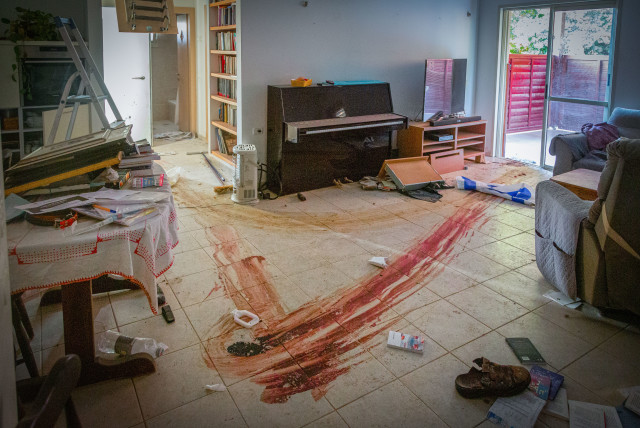Hezbollah's Nasrallah blames IDF for massacre of Israelis

The Hezbollah leader claimed that a wider conflict in the Middle East was a realistic possibility.
The leader of Lebanon's Hezbollah warned the United States on Friday that preventing a regional war depended on stopping the Israeli attack on Gaza, and there was a realistic possibility of fighting on the Lebanese front turning into a "wide war."
Sayyed Hassan Nasrallah, in his first speech since the Israel-Hamas war erupted on Oct. 7, also threatened Israel's main ally the United States, hinting his Iran-backed group was ready to confront US warships in the Mediterranean.
Nasrallah went on to claim that the October 7 massacre was carried out by Israeli forces on Israeli civilians, adding that there was no evidence of Hamas beheading babies.
In the speech, he claimed that "brothers from Hamas" had planned the October 7 attack alone, and they hid it from their other terrorist allies. Despite the secrecy, the terrorist leader insisted that the attack did not upset anyone in the "resistance axis."
Nasrallah, in further praise of the attack, stated that the" Al-Aqsa Flood," as Hamas calls its offensive against Israel, had exposed Israel's weakness. The attack took the lives of 1400 people, including the lives of civilians and Arab Israelis.
He said the Oct. 7 operation led to an "earthquake" in Israel and claimed that it exposed the country's weakness.
Bragging, Nasrallah celebrated that Israel was "under financial pressure" after multiple towns near the Gaza border were evacuated. He claimed that Israel was "anxious that front could escalate..."
Mocking Israel, the terrorist leader said that in a whole month, Israel had failed to rescue any hostage or make any significant military achievement.
Nasrallah's message to the US
"You, the Americans, can stop the aggression against Gaza because it is your aggression. Whoever wants to prevent a regional war, and I am talking to the Americans, must quickly halt the aggression on Gaza," Nasrallah said.
"You, the Americans, know very well that if war breaks out in the region, your fleets will be of no use, nor will fighting from the air be of any benefit, and the one who will pay the price will be ... your interests, your soldiers and your fleets," he said.
Referring to US warships in the Mediterranean, he said Hezbollah was not afraid of these. "I tell you with all sincerity, we have prepared well for your fleets, with which you are threatening us," he said.
Lebanon's terrorist group Hezbollah should not try to take advantage of the conflict between Israel and Hamas, a spokesperson for the White House's National Security Council said on Friday.
The United States does not want to see the conflict expand into Lebanon, the spokesperson said.
The Hamas-run Gaza health authorities say at least 9,227 people - many of them women and children - have been killed since Israel started its blitz on the small coastal enclave of 2.3 million people.
Lebanon looks to expand role in war
Since the Gaza war erupted, Hezbollah, a formidable military force backed by Iran, has been engaging Israeli forces along the Lebanon-Israel border in the deadliest escalation since it fought a war with Israel in 2006.
In an unveiled threat to Israel, he claimed that a pre-emptive strike on Lebanon would be a "stupid mistake."
He insisted that the first goal was to stop "aggression" against Gaza, and the second goal would be to ensure the victory of Hamas. He insisted that countries end trade with Israel and that Arab and Muslim countries cease sending oil to the United States. He also insisted that there should be a collective effort to open the Rafah Crossing, which connects Gaza to Egypt.
Nasrallah said Hezbollah had been escalating day by day at the Lebanese front, forcing Israel to keep forces near its northern frontier instead of the Gaza Strip and the West Bank to the southwest.
"In our front, all options are open," he insisted. "All the options are open to us and we studied all the options. We must be ready and be ready for all the options that could happen in the future."
How that front develops would depend on the course of events in Gaza, and Israeli actions in Lebanon, he said.
Jerusalem Post Store
`; document.getElementById("linkPremium").innerHTML = cont; var divWithLink = document.getElementById("premium-link"); if (divWithLink !== null && divWithLink !== 'undefined') { divWithLink.style.border = "solid 1px #cb0f3e"; divWithLink.style.textAlign = "center"; divWithLink.style.marginBottom = "15px"; divWithLink.style.marginTop = "15px"; divWithLink.style.width = "100%"; divWithLink.style.backgroundColor = "#122952"; divWithLink.style.color = "#ffffff"; divWithLink.style.lineHeight = "1.5"; } } (function (v, i) { });


